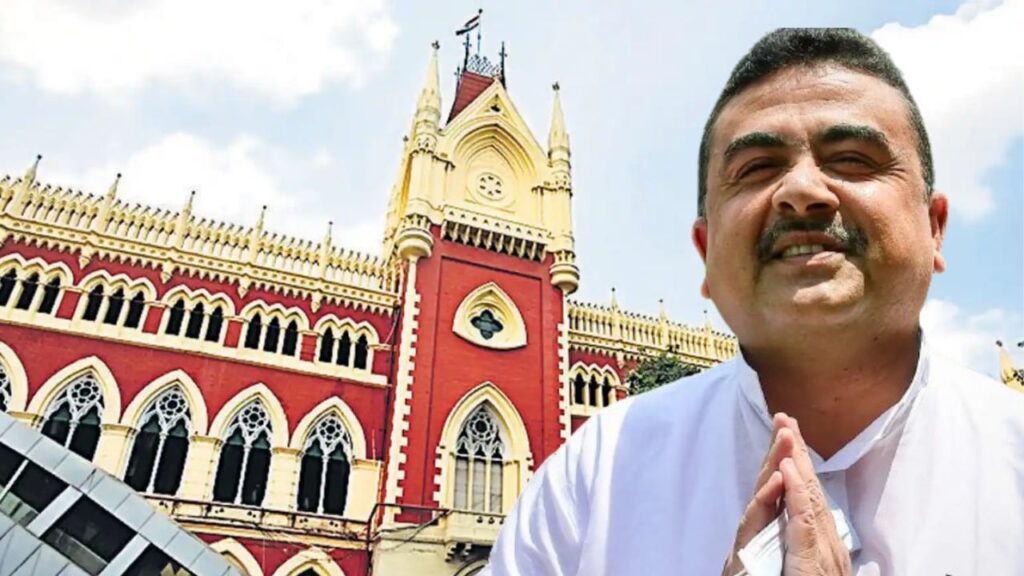News Desk, Kolkata : Shubhendu Adhikari’s Legal Battle Unfolds in Sandeshkhali ;
In a dramatic turn of events, opposition party leader Shubhendu Adhikari is set to appear in court in Sandeshkhali, challenging the legal obstacles preventing him from visiting the region. As of now, the four gram panchayats that fall under Section 144 restrictions don’t include the areas Shubhendu Adhikari wishes to visit, leaving room for speculation on whether he will successfully reach his desired destination.
The primary scrutiny of the case lies in the hands of Justice Kaushik Chander, who awaits Shubhendu Adhikari’s plea on Monday. However, uncertainty looms over whether Adhikari will indeed make his way to Sandeshkhali. The suspense is heightened as he is expected to reveal his intentions during a press briefing at three in the afternoon.
The legal battle takes an intriguing turn as Rajdeep Majumdar, the opposition leader’s legal representative, questions the circumstances surrounding Section 144. Adhikari’s attempt to visit Sandeshkhali on February 12 was thwarted by authorities, citing the need to detain any opposition leader creating a potentially volatile situation. The plea contends that Adhikari should be allowed to visit any place freely unless it falls under Section 144 restrictions within a 30-kilometer radius, which was not the case in this instance.
On February 13, the administration issues a late-night statement, adding Section 144 to the areas in question based on a directive from the High Court. This late addition raises eyebrows and raises questions about the timing and the legal grounds for such an amendment.
The courtroom exchanges between Rajdeep Majumdar and Justice Kaushik Chander shed light on the complexity of the case. Adhikari’s legal team asserts that he was unlawfully detained, emphasizing the need for a transparent investigation into the alleged incidents of violence against women in the region, a claim disputed by the local administration.
Advocate General Kishor Dutt weighs in, asserting that Adhikari is not a resident of the specified areas and therefore doesn’t have the right to challenge Section 144 restrictions. Additionally, the Central Intelligence reports, crucial in understanding the potential consequences of Adhikari’s visit to Sandeshkhali, are yet to be disclosed.
As the courtroom drama unfolds, Rajdeep Majumdar poses questions about the reported incidents of violence against women in Sandeshkhali, urging the court to consider two IB reports for a comprehensive evaluation of the situation.
Adhikari’s legal representative, undeterred by the unfolding events, emphasizes the absence of Section 144 in the four gram panchayats Adhikari aims to visit. The argument contends that Shubhendu Adhikari should be allowed unrestricted access to these areas.
In response to the legal proceedings, Advocate General Kishor Dutt clarifies that the allegations of violence against women are not attributed to local residents, refuting the need for Adhikari’s visit in the context of those specific claims.
The courtroom discourse brings attention to the broader constitutional rights of citizens, emphasizing that any ordinary citizen in India has the right to visit any place unless restricted by Section 144. Shubhendu Adhikari’s legal team underscores that he faces no barriers to reaching Sandeshkhali based on the absence of Section 144 in the targeted gram panchayats.
As the legal battle continues, the spotlight intensifies on the constitutional implications and the dynamic narrative surrounding Shubhendu Adhikari’s attempt to reach Sandeshkhali. The evolving saga prompts a deeper exploration of the legal intricacies, political motivations, and the potential ramifications on Adhikari’s political standing.
DISCLAIMER
Our news media denounces any form of bias and disapproves of sensationalism. The disseminated news is entirely educational and aimed at social awareness. Our media maintains absolute impartiality, adhering solely to the purpose of education and social consciousness.


